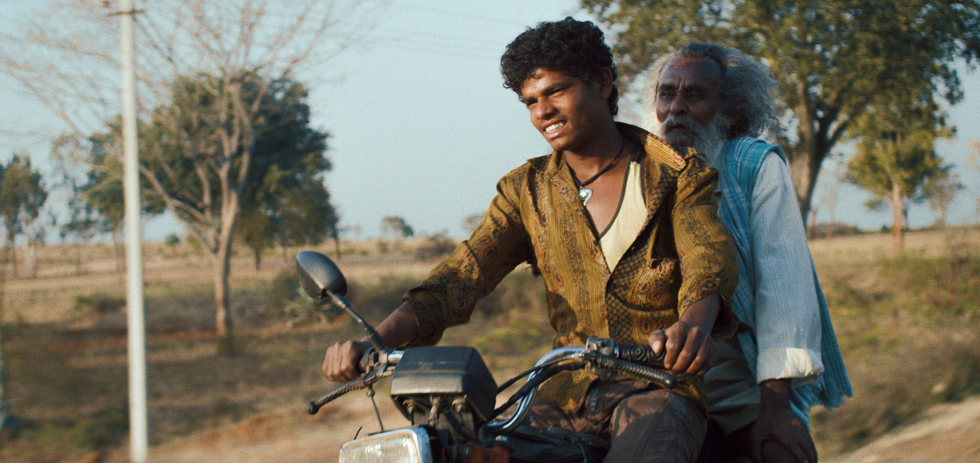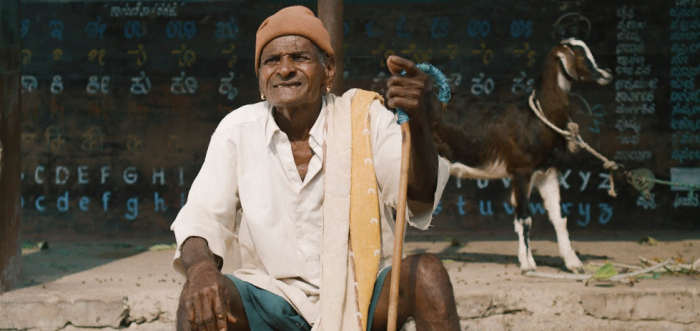
Indian director Raam Reddy’s debut film Thithi is a Kannada-language minimalist drama that revolves around the intergenerational search for a distinct postcolonial Indian identity. Using the right balance of bleakness and absurdity, as well as a cast consisting largely of non-professional actors, the film offers a nuanced critique from a socio-historical perspective on how India sees itself, while managing to be outrageously funny. This is a tricky tightrope to walk, but in Reddy’s capable hands, the film stays true to its purpose and passes with flying colours.
Thithi has one of the most memorable openings in recent memory. We are introduced to a geriatric patriarch, dubbed “Century Gowda” because he is more than a hundred years old, who is making rude and lambasting remarks to all who pass by. He stands up, walks a little and then squats to take a dump. And just like that, while in the process of taking a dump, he collapses and dies. Reddy holds the shot for just that extra moment, as the audience is allowed to simmer in the absurdity of what has just occurred on screen. It’s a highly dramatic opening from a narrative point of view, but the dramatic exegesis is stripped away by the frame, and all that remains is the sheer absurdity of what has unfolded in screen.
The audience follows the actions of three generations of Century Gowda’s family: his son Gadappa, his grandson Thamanna and his great-grandson Abhi, in the lead-up to his Thithi (death ceremony) eleven days after his death. Gadappa, who has been bequeathed a substantial amount of land after Century Gowda’s death, doesn’t want anything to do with it and is more than happy to while away his days living a nomadic lifestyle. Thamanna on the other hand, is more materialistic, and wants the land to be transferred in his name at any cost. Meanwhile, Abhi is more interested in pursuing a romance with a shepherd girl and couldn’t care less about familial ties.
Century Gowda represents India’s colonial past and its tense relationship with its own colonial history. At many important junctures throughout the film, the legacy he has left behind crops up as a recurring motif, symbolic of a nation trying to assess the supposed legacy and impact of colonialism on its geographical and cultural milieu. Gadappa personalises the disenchantment and disillusionment of newly independent India, with all its hopes, dreams and aspirations buried under the wounds of a bloody partition. Much like newly independent India felt betrayed and hurt beyond repair by its past colonial masters, Gadappa too has wounds that have not healed when it came to his relationship with Century Gowda. Gadappa recounts the moment this betrayal hits him in a beautifully understated, yet powerfully evocative scene.

The conniving, scheming and materialistic Thamanna symbolises the birth of modern India, as it finally opened its doors to free trade and globalising, capitalist influences after living under policies of Fabian socialism and non-alignment for much of the Cold War. Thamanna cannot comprehend or connect with Gadappa’s sense of betrayal, mirroring a new generation of Indians eager to forge their own identity in a world that had sheltered them from the wounds of the partition. The pain had lost its immediacy and became a historical factoid, re-iterated in history textbooks in schools but far removed from the feelings of loss and hurt that it invariably carried for the generation that had suffered through it. The great-grandson Abhi is the youth of postmodern India, expected to carry forth Indian values and traditions, yet determined to find his own path in his own way, despite the baggage of expectations.
This postcolonial analysis doesn’t take away from the fact that Thithi is undoubtedly an engaging and incredibly funny film. The allegory isn’t harped on for dramatic effect, but rather, it develops in the background slowly and gradually, until all the pieces fit together. Meanwhile, Reddy is able to get the best from his cast of non-professional actors, which is no small feat. All the cast members commit to their characters and have a keen sense of camera awareness. For a film that relies so heavily on situational absurdity, all the performers have a unique command over timing of their dialogue delivery. This is quite a difficult craft that even seasoned actors struggle to get right. However, these performers make it look effortless. It would be unfair to single out a performance, as it really is the collective commitment by the performers to their characters, big or small, that makes the film work.
Cinematography by Doron Tempert creates this absurd universe which these characters inhabit. The way some of the wide shots are framed, emphasising the vast expanse of space, gives the impression that this could very well be a parallel universe, removed from pragmatic sensibilities of real life. The setting also allows for the minimalist focus to have its desired effect: you feel as if these characters are trapped in this universe and cannot escape it. Editing by John Zimmerman and Raam Reddy in combination is one of the more visually focused efforts I have come across when looking at cinema from India. The length of each shot works to further the directorial vision, especially when it comes to undercutting or heightening the sense of absurdity at different points in the narrative.
Following close on the heels of a highlight from last year’s Sydney Film Festival, Court, Thithi is yet another minimalist gem from a debut director that relies on a cast of largely non-professional actors and the potent affectation of absurdity and bleak humour to convey its larger thematic sensibilities. It’s a welcome addition to the emerging focus of Indian cinema on coming to terms with the social, cultural and historical evolution of a nation, particularly in a postcolonial context.
Around the Staff
| Jaymes Durante |
